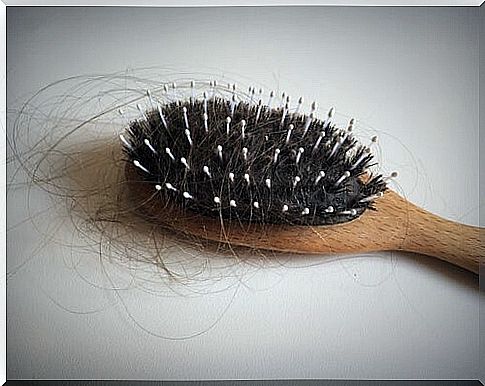Nervousness, Stress And Hair Loss

One of the most common causes of hair loss is stress. This data is important considering that many people fail to realize the degree to which they suffer from it. They are so immersed in their concerns that they cannot see their own situation objectively. Hair loss is a sign that something is going on in the emotional world.
Hair loss is not always due to stress. However, if there is no organic cause or you are not ingesting any medication or substance that precipitates hair loss, it means that it is a symptom of stress. This has been proven by science.
Stress triggers a series of physiological processes that lead to hair loss. Although we all lose hair, when this becomes constant and intense, we must take note. Although doctors do not usually give importance to this fact, many people are concerned about it.

Hair loss
The normal thing is that people have between 100,000 and 150,000 hairs on our scalp. Experts indicate that around 85% of these hairs are in the growth phase . Between 13 and 14% are in the decline phase. And the remaining 1 or 2% is in the resting phase.
The normal thing is that in a day we lose between 70 and 100 hairs. These are easily replaced thanks to the new hair growth process. When hair loss occurs due to stress, the loss occurs in a generalized way.
In other words, if you run your hand over your head, you have hair between your fingers. If you comb your hair, the same thing happens. And you often see fallen hair on your pillow and on your clothes. Sometimes this condition is called alopecia nervosa and leads to small areas of hairlessness on your head in a relatively short time. The good news is that it is a reversible situation.
Stress and hair loss
Faced with stress, the body becomes alert. In this sense, stress is nothing more than a reaction to stimuli that are perceived as threatening. Under these conditions, the body tries to save the energy it has available. That is why it concentrates on the basic physiological functions and leaves out others, such as the growth of nails or hair.
According to the Mayo Clinic, there are three types of hair loss that can be related to stress. These are:
- Telogen effluvium. It occurs when the root of the hair follicle interrupts the hair growth process. One of the reasons this occurs is due to the presence of high levels of cortisol, the stress hormone. It doesn’t happen right away, but after a time of experiencing stress.
- Alopecia areata. In this case what happens is that the immune system attacks the hair follicles. When this happens, the hair falls out in large quantities, practically in strands. This usually affects the beard and eyebrows as well.
- Trichotillomania. This is a more complex picture, in which it is the person himself who pulls his hair. He does this as a misleading way of dealing with worries, doubts, and feelings of frustration.

To do?
Whenever we notice a generalized hair loss, it is best to consult with the doctor. This fact can be due to stress, but also to endocrine, immune or other problems. If an organic or pharmacological cause is ruled out, obviously what is required is to treat the source of stress to prevent hair loss.
Exercise is a natural and healthy way to manage stress. It is appropriate to carry out physical activities on a regular basis and not just in moments of inspiration. Walking for half an hour or exercising for 15 minutes a day is usually sufficient. Likewise, it is highly recommended to sleep at least seven hours a day.
If you feel that the worries are very intense and that they do not dissipate even if you seek means of relaxation, it may be time to visit a psychologist. There are times when it is necessary to have external support to ensure that these concerns and concerns are naturally diluted.









